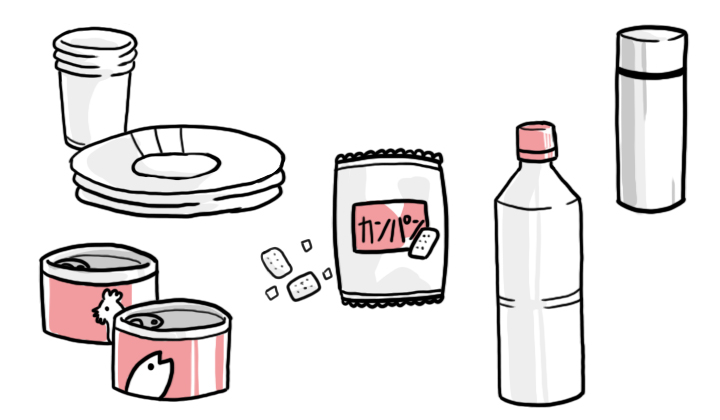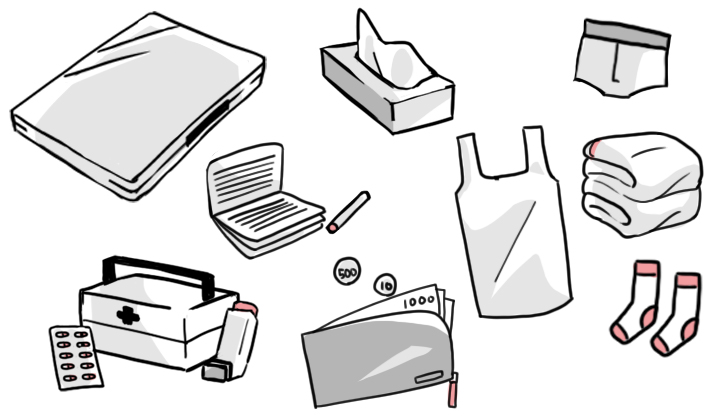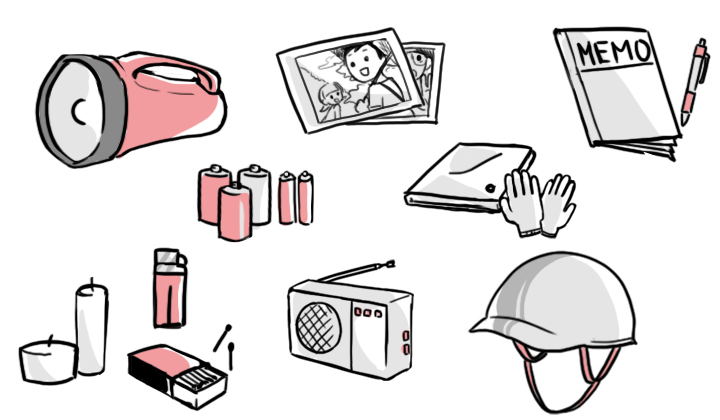Things to Take With You in an Emergency
You should have the necessary items ready so that you can evacuate immediately in an emergency. However, it is important not to take too many things. Limit your evacuation baggage to essential items and valuables. Using the information below as a reference, discuss with your family members what you need, and prepare them accordingly.
Pack the items in a backpack or other suitable bag, and place it at a location where it is easy to pick up, such as at the entrance of your home or in your bedroom.
Things to Pack for an Emergency
Immediately after a natural disaster, water and food may not be readily available. You should prepare at least 2 to 3 days’ worth of food and water for your entire family.
It is also recommended to have a somewhat larger stock of water and food, and to replace it regularly.
Check about once or twice per year for expired items, etc. In the cold season, you should also prepare warm clothing and other items for protection against cold.
- Foodstuff
-
Drinking water (about 3 liters per person per day), emergency food (cup noodles, ready meals in retort pouches, sweets, etc. Also include things that can be eaten without heating, such as canned hard biscuits and canned food.), can opener, bottle opener, knife, water bottle, paper plates, paper cups, etc.

- Clothes, etc.
- Outerwear, underwear, socks, towel, mask, slippers, etc.
- Medical and sanitary products
- Wet wipes, first aid supplies (wound ointment, bandages, adhesive plasters, slings, gauze, absorbent cotton, disinfectant, etc.), medicine (antipyretic, gastrointestinal, analgesics, and other over-the-counter medicines), eye drops, cotton swabs, thermometer, nail clippers, thorn remover, tissue paper, sanitary napkins, toothbrushes, soap, etc.
- Valuables
- Cash (including small change for public phones), savings passbook, certificates, personal seal, driver's license, health insurance card, identification card, car and house keys, etc.

- Items for evacuating safely
- Whistle, helmet and disaster prevention cowl, flashlight (including extra batteries)
- Items for obtaining information
- Portable radio (including spare batteries), mobile phone (including charger), family photos (to confirm identity when separated), contact information for family and acquaintances, wide-area evacuation map, notepad, writing utensils

- Individual necessities
- Powdered milk and baby bottles, maternal and child health handbook, disposable diapers, glasses and contact lenses, pet supplies (such as pet food and toilet supplies), foods that are easy for the elderly or infants to eat, foods for special allergies
- Other items
- Lighters (matches), candles, plastic sheets, cotton or rubber gloves, plastic bags, ropes, hand warmers (in winter), rain gear, canes, blankets, portable propane stoves, portable toilets, etc.
Some portable items should be carried regularly when you go out.
Examples: whistle, writing utensils, medication for people with chronic illness, etc.
Information for Foreign Residents of Japan Menu

